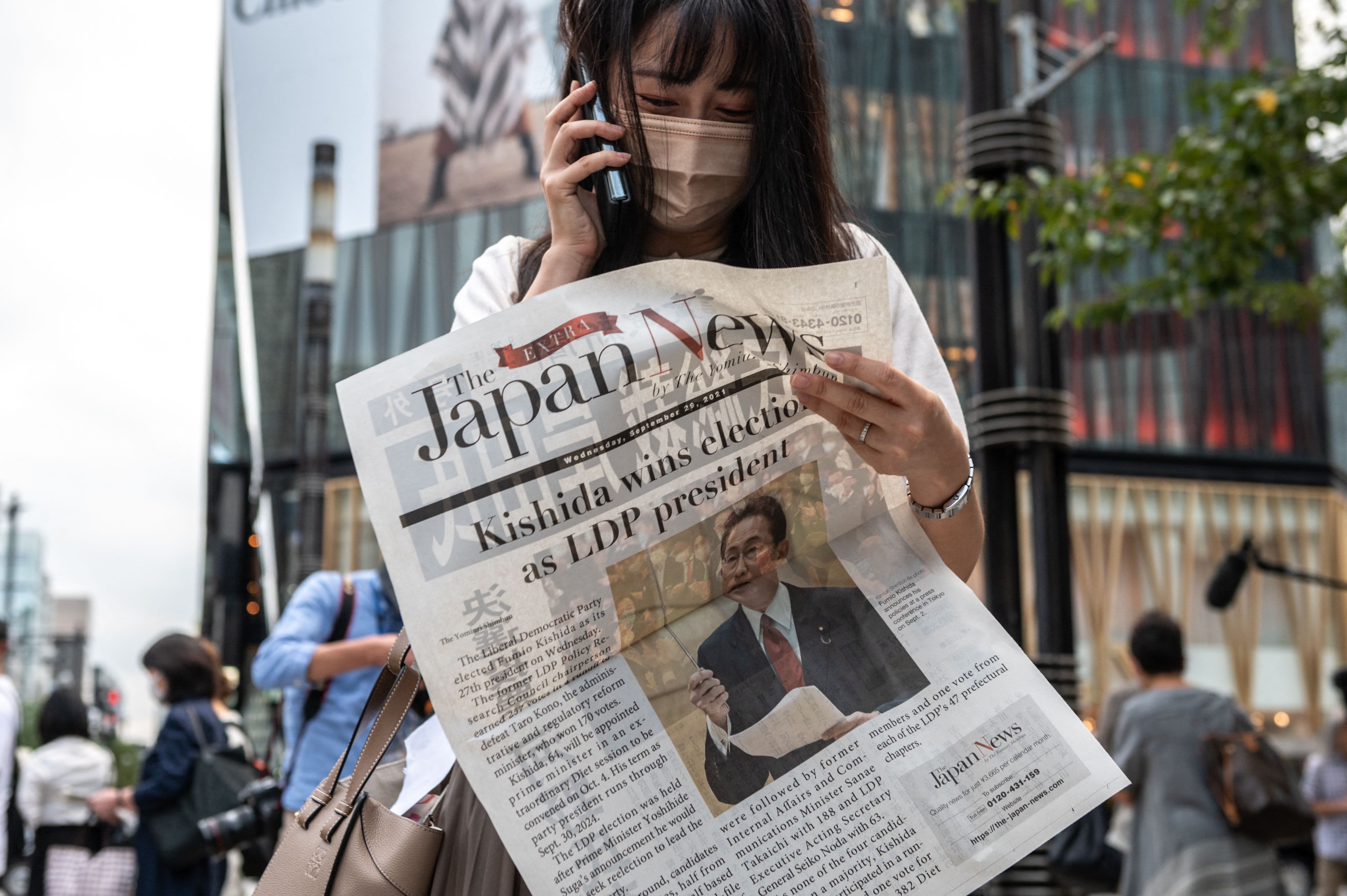
A pedestrian reads an extra edition newspaper reporting Fumio Kishida, former foreign minister, being elected as the new leader at the ruling Liberal Democratic Party (LDP) presidential election, in Ginza district of Tokyo on September 29, 2021.
PHILIP FONG | AFP via Getty Images
Fumio Kishida is set to become Japan’s next prime minister after winning the leadership race at Japan’s ruling Liberal Democratic Party on Wednesday.
The former foreign minister ousted his closest rival, popular vaccine tsar Taro Kono, in a runoff vote after none of the four candidates was able to win a majority in the first round.
Kishida’s victory sets him up to replace outgoing party leader and Prime Minister Yoshihide Suga, who is stepping down just a year after taking the top job. Given the LDP and its coalition partner’s control of the house, Kishida is certain to also become Japan’s next prime minister.
Prior to his announcement of stepping aside, Suga’s approval ratings were already plunging amid widespread criticism of his administration’s handling of the pandemic. Critics slammed his decision to carry on hosting the summer Olympic Games in Tokyo despite the area being under a state of emergency at that time.
Kishida was one of Suga’s key challengers in the LDP leadership race in 2020, when former Prime Minister Shinzo Abe unexpectedly resigned due to ill health.
Win for LDP technocrats
Kishida’s election as leader of the LDP “marks a win” for the party’s technocrats establishment, said Jesper Koll, a director at Monex Group.
“Kishida stands for stability, for not rocking the boat, and most importantly, for doing what elite technocrats tell him to do,” Koll said in a note on Wednesday. “On economic and financial policy, Kishida will follow a path of steadfast but incremental change.”
His promises on the campaign trail, which included a pledge not to hike the consumption tax for 10 years and a review of the pension and health-care system, were surprising given that he was “generally bland and unexciting on the public stage,” Koll said.
Prior to Kishida’s election win, Goldman Sachs’ Naohiko Baba told CNBC’s “Street Signs Asia” on Wednesday that the former foreign minister is expected to focus more on income redistribution to address income inequality in the country.
Good track record
One of Kishida’s first tasks is to lead the LDP in Japan’s lower house elections. That’s set to take place in the next few months.
Ahead of those polls, the incoming prime minister is expected to get “plenty of favorable media coverage” that will give him a boost, according to Tobias Harris, senior fellow for Asia at the the Center for American Progress.
While Kishida may not be “the most exciting personality” in terms of LDP leadership, he’s “pleasant enough,” Harris told CNBC on Thursday. “He’s got a pretty good … reputation, a good record from when he was foreign minister.”
Another advantage is that Kashida wasn’t part of the Suga government and “it’s harder to attack him for the Suga government’s handling of the pandemic, so that’s working in his favor,” he said.
Tackling Covid
Japan has faced multiple waves of Covid infections since 2020, and its vaccination drive ramped up significantly in the last few months following a slow start.
As of Sept. 28, 59% of people in Japan were fully vaccinated against Covid-19 — higher than the United States’ 55.09%, according to Our World in Data.
Harris pointed out that Covid infections have been on the downtrend in Japan. The government announced this week that it will end the coronavirus state of emergency in all regions on Thursday.
As a result, “You might not have the public as eager to turn out to vote against the LDP, and that was really the concern with Suga,” Harris said.
Most prime ministers also tend to get a “nice bump in the polls” after taking office, the analyst said: “I don’t think there’s really any reason to think that Kishida won’t get that.”




